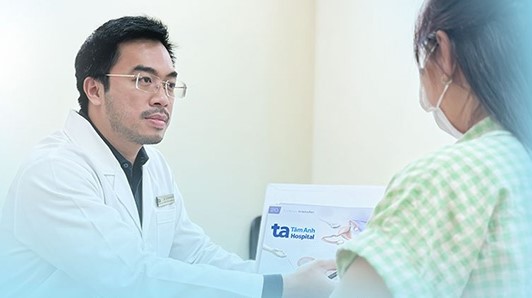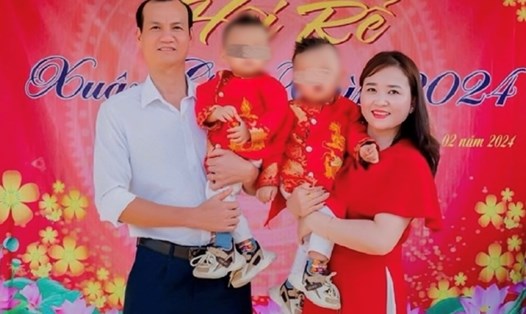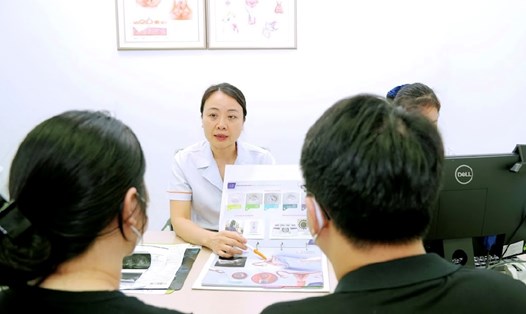Married in 2010, Ms. V (name changed, in Binh Phuoc province) took many traditional medicine medicine hoping to conceive soon. 2 years later, Ms. V became pregnant naturally, and the results of the ultrasound in the locality were normal.
At 23 weeks of pregnancy, Ms. V went to a hospital in Ho Chi Minh City to examine and discovered a fetus with severe heart and brain defects. The doctor ordered an end to the pregnancy, but Ms. V decided to keep the child. However, the son was born prematurely, at 26 weeks of pregnancy, and died after giving birth due to severe birth defects.
After 2 years of not having a pregnancy again, Ms. V and her husband decided to go to the doctor. Ms. V's husband was diagnosed with weak sperm, deformed up to 80%; and Ms. V's ovarian reserve was reduced due to old age.
The couple started performing in vitro fertilization (IVF) at a hospital, growing 5 embryos on the third day, transferring the embryos twice without conception. In 2015 - 2021, the couple received 2 more IVF cycles at another hospital, and failed 5 more embryo transfers.
At the end of 2023, at the age of 46, Ms. V went to the Reproductive Support Center, Tam Anh General Hospital, Ho Chi Minh City. Accompanying Ms. V and her husband on their journey to find a child, Doctor Le Xuan Nguyen - Reproductive Support Center, Tam Anh General Hospital, Ho Chi Minh City said that Ms. V and her husband are both old and have complicated medical conditions.

The husband had difficulty getting sperm samples for hypogonadism and erectile dysfunction. The wife's ovarian reserve was almost exhausted, the quantity and quality of the eggs were poor, and the failed failed embryo transfer many times suggested abnormalities in the uterus that hindered the embryos from forming nests and developing. Ms. V's ovaries were stimulated.
Doctor Nguyen ultrasound tracks the development of ovarian follicles, suckles to collect 3 mature eggs before completely depleting the ovarian reserve.
Determined to have children, Ms. V asked for more eggs from her younger sister, helping to get a total of 10 eggs. Her husband underwent testicular surgery to find sperm.
Embryo specialists selected sperm that were suitable for injection into egg soy sauce, culture embryos in optimal environments to collect 7 embryos on day 5, of which 2 embryos were from endogenous eggs. All embryos were frozen.
After endoscoping Ms. V's uterine cavity, Dr. Nguyen noted endometriosis and endometriosis. The doctor prescribes antibiotics to treat endometriosis and endometriosis inhibitors for 2 months.
Ms. V was prepared with qualified endometriosis before Dr. Nguyen transferred an individual embryo from an endometriosis to the uterine cavity to help her conceive. However, frequent anxiety causes the fetus to sinhasize.
In early June 2023, Ms. V was instructed to stabilize her psychology, reduce stress, have a full diet, and exercise gently before, during and after the embryo transfer stages. Doctor Nguyen transferred the remaining "pre-owner" embryo to the uterine cavity to help her conceive.
The doctor monitored Ms. V's pregnancy until week 12, when the fetus was stable, and transferred her to the Obstetrics and Gynecology Center. At the end of January 2025, Ms. V conveniently gave birth to a healthy baby boy, weighing 3kg.
"You are the sweet fruit that my wife and I have been looking forward to for many years. The couple is happy and satisfied because they have persevered in treatment" - Ms. V shared.
Previously, in early June 2024, Dr. Nguyen also accompanied the couple Ms. L ( Patient's name has been changed, 31 years old) who were infertile. The doctor combined the "gom egg" and "gom embryo" strategies for a 31-year-old infertile woman with early ovarian failure, helping Ms. L become pregnant after transferring 2 rare embryos.
At the Reproduction Support Center, Tam Anh General Hospital, Ho Chi Minh City, every year, doctors receive and treat about 60% of cases of elderly couples with few eggs, long-term infertility, and failed failed failed failed embryo transfers. The unit invests in technology, modern strategies and models, helping to save every hope for patients.
The child is the "sweet apple, the sweet fruit" that infertile couples have been waiting for for for many years. This overwhelming happiness is not only for the family, but also the joy of the doctors - who have always devoted themselves to accompanying couples on the journey to find "sweet fruit".











